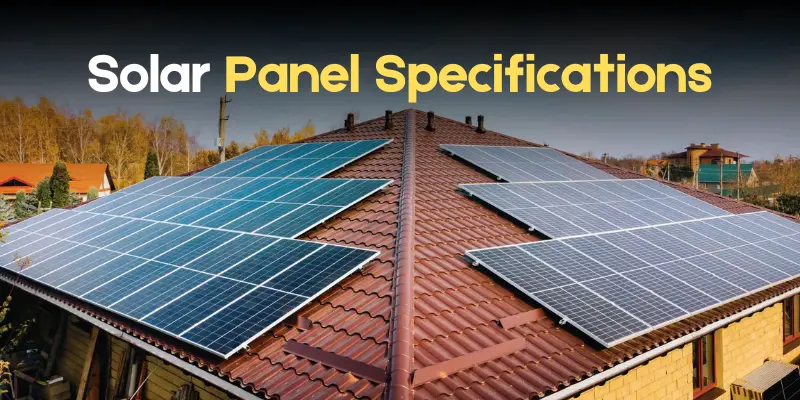Solar Panel Specifications: How to Choose the Right System
Updated: 06 Dec 2024
108
Introduction
Solar panels are a great way to generate clean energy and save on electricity costs, but choosing the right one for your home or business requires understanding the technical details. These details are called solar panel specifications, and they outline everything you need to know about how the panels will perform.
In this guide, we will explain the key specifications of solar panels, why they are important, and how they affect the overall performance of your solar power system. Whether you are thinking about installing solar panels or simply curious about how they work, this guide will help you understand the basics.
What Are Solar Panel Specifications?

Solar panel specifications are the technical details that define how a solar panel operates. These details include things like its power output, size, efficiency, and durability. Think of the specification sheet as a blueprint that tells you everything about the panel’s capabilities, how much power it can produce, how efficient it is, and how long it will last.
Why is this important? Simply put, the better you understand the specifications, the easier it will be for you to choose the best solar panels for your energy needs.
Key Electrical Specifications to Know
Understanding the electrical specifications is crucial because they tell you how much power your solar panels can generate and how efficiently they convert sunlight into electricity. Here are the most important electrical specs to consider:
1. Pmax (Maximum Power Output)
- What is Pmax?
- Pmax, or Maximum Power, refers to the maximum amount of power that a solar panel can generate under ideal conditions. It’s typically measured in watts (W), and the higher the number, the more power the panel can produce.
- Why is it important?
- The Pmax rating helps you understand how much energy a panel can provide. For example, if you have a panel with a 450W Pmax, it can produce up to 450 watts of electricity in perfect sunlight.
Example: A panel rated at 450W will produce more electricity than a 350W panel, even if they are the same size. This means that you need fewer panels to generate the same amount of energy.
2. Voltage and Current
- Vmp (Maximum Power Voltage) and Voc (Open Circuit Voltage)
- Vmp is the voltage the panel generates when it is producing the maximum power output. It helps determine how much voltage the panel will provide in your solar system.
- Voc is the highest voltage a panel can reach when there is no load connected to it.
- Why is it important?
- The voltage determines how well the solar panel works with your system. Too high of a voltage can damage the system, while too low of a voltage might not generate enough power.
Example: A 41.39V voltage rating means the panel is most efficient at that voltage level. It ensures that the panel delivers maximum power output without exceeding safe voltage levels.
3. Isc (Short Circuit Current)
- What is Isc?
- Isc measures the maximum current a solar panel can produce when the positive and negative terminals are directly connected. It helps ensure the panel doesn’t overproduce electricity in unsafe conditions.
- Why is it important?
- The Isc helps determine the size of the wiring and the charge controller for your solar system. If the current exceeds the rated capacity, it could damage the panel.
Mechanical Specifications to Consider
While electrical specifications tell you about a panel’s power capabilities, mechanical specifications give you information about its physical durability and size. Here are the key mechanical specifications to know:
1. Panel Size and Weight
- Size: The physical dimensions of solar panels vary, but most residential panels measure about 5.5 feet by 3 feet. Commercial panels are typically 6.5 feet by 3 feet.
- Weight: The weight of the panel is important because it affects the installation process and the amount of load your roof can handle. Most panels weigh between 40 and 50 pounds, with larger commercial panels weighing more.
- Why is it important? The size and weight determine how many panels can fit on your roof and how much structural support is needed.
- Example: A 550W panel is larger and heavier than a 450W panel, but it can produce more power. This might mean you need fewer panels to meet your energy needs, reducing the overall weight on your roof.
2. Load Ratings (Wind and Snow Load)
What is load rating?
- The load rating tells you how much pressure (from wind, snow, or other factors) the panel can withstand without breaking. It’s measured in Pascals (Pa).
Why is it important?
- If you live in an area with heavy snow or strong winds, you need to make sure the solar panels you choose can handle these conditions.
Example: Panels with a 5400 Pascal rating can withstand higher loads, making them suitable for areas with strong winds or heavy snow.
3. Durability and Lifespan
What is the lifespan of a solar panel?
- Solar panels typically have a long lifespan, often lasting 25 years or more. Most come with a 12-year warranty on the product and a 30-year design life warranty. After 20 years, a panel may still produce about 80% of its original power output.
Why is it important?
- A longer lifespan means you’ll get more value from your investment. Look for panels with good warranties and high-efficiency ratings to ensure long-term performance.
Temperature and Environmental Factors

The performance of your solar panels can be affected by temperature and environmental conditions, so it’s important to consider these factors before installation.
1. Effect of Temperature on Solar Panel Performance
What happens in extreme temperatures?
- Cold temperatures can actually improve solar panel efficiency, while heat reduces it. Panels work best in moderate temperatures, but they can still perform well in cooler climates.
Why is it important?
- Understanding the temperature coefficient (how much performance drops per degree of temperature increase) helps you anticipate how well your panels will perform in different climates.
Example: A panel with a lower temperature coefficient will perform better in hot conditions compared to one with a higher coefficient.
2. Considerations for Extreme Weather
What to do if you live in an area with extreme weather?
- In areas with high winds, snow, or other extreme conditions, it’s important to choose solar panels with high wind and snow load ratings.
Tip: Make sure the panels you select can handle extreme weather to avoid damage and ensure they continue to perform efficiently.
Conclusion
In summary, understanding solar panel specifications is essential for selecting the right system for your needs. By focusing on key specifications like power output (Pmax), efficiency, voltage, and load ratings, you can choose panels that will provide reliable, long-term energy generation. Always consider your specific needs—whether it’s the size of the panels, the environmental conditions, or the amount of power you need to generate.
If you’re unsure which solar panels are best for your home or business, consider consulting with a professional solar installer who can guide you through the process.
How do I choose the best solar panel for my home?
When choosing the best solar panel, focus on efficiency (how well the panel converts sunlight into electricity), power output (Pmax, which indicates how much power the panel can generate), and warranty (which reflects the panel’s durability and long-term performance). Choose a panel that offers a balance of high efficiency, suitable output, and a strong warranty for peace of mind.
What does “Pmax” mean for solar panels?
Pmax stands for Maximum Power Output and refers to the highest amount of power a solar panel can generate under ideal conditions (clear, direct sunlight). It’s measured in watts (W) and helps you determine how much energy the panel can produce, guiding you in selecting the right system size for your needs.
What happens if I exceed the voltage limit of my solar panel system?
Exceeding the voltage limit can cause the system to underperform or potentially damage your solar panels and other components. It may lead to issues like reduced energy efficiency, overheating, or failure of the panel’s internal circuitry. Always ensure your system components, like the inverter and battery, match the voltage specifications of your panels.
What is the importance of the “temperature coefficient” in solar panels?
The temperature coefficient shows how much a solar panel’s efficiency drops as the temperature increases. Solar panels become less efficient in hot weather, and the temperature coefficient helps you understand how much power loss you can expect for every degree rise in temperature. Panels with a lower temperature coefficient will perform better in hot climates.
How do I know if my roof can support the weight of solar panels?
Before installing solar panels, it’s important to check your roof’s weight tolerance. Solar panels, along with mounting hardware and other equipment, can add significant weight. To ensure your roof can handle it, consider consulting a roofing professional who can assess the structure and suggest reinforcement if needed. Most newer roofs can easily support solar systems, but an inspection can provide extra peace of mind.
What is the difference between monocrystalline and polycrystalline solar panels?
Monocrystalline panels are made from a single crystal of silicon, making them more efficient and space-saving. They perform better in low-light conditions and have a longer lifespan.
Polycrystalline panels, on the other hand, are made from multiple silicon fragments melted together. They are slightly less efficient but more affordable, making them a good option for larger installations where space is not a constraint.
Tip: If you want higher efficiency and have a smaller roof, monocrystalline panels are the better choice. If you’re on a budget, polycrystalline panels can be a cost-effective alternative.
Please Write Your Comments